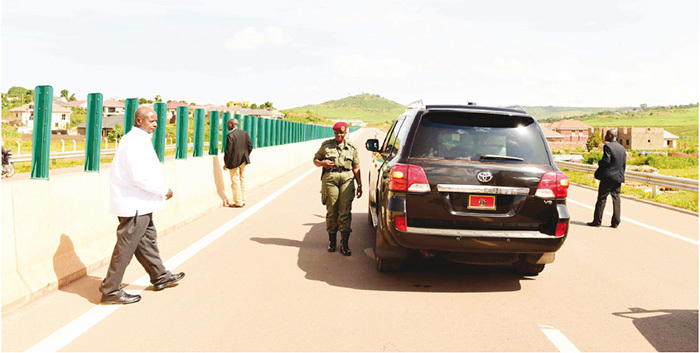China is our true friend, says Museveni
Now that China is a richer country, they are giving us good credit in form of soft loans to build infrastructure.
President Museveni and the President of the People's Republic of China, Xi JinPing
CHINA SUPPORTS OUR INDEPENDENCE
On May 24, Vision Group held an exclusive interview with President Yoweri Museveni about several aspects of the China-Uganda relations. Below are excerpts from the interview.
Q: Give us an overview of the China-Uganda relationship. Why is it important to us?
A: Our relationship with China is a long story, which is related to the history of Africa. By 1900, the whole of Africa was colonised, except for Ethiopia. Our ancestors could not fight because of internal weaknesses. They tried to defend themselves, but they could not fi ght because they had made a lot of mistakes like tribalism and fighting one another.
Europeans were able to defeat them, one by one because they were not united. The Europeans did want to go away; they wanted to stay. Fortunately, Africans are tough people.
Resistance groups sprung up. The ANC (African National Congress) in South Africa was founded in 1912 and was the first African freedom movement to reverse colonialism.
The biggest boost was that in 1917, Russia was taken over by the communists, who did not agree with the western people. They started supporting us because we were fighting their enemies. Then, in 1949, China was also taken over by communists. They supported us to regain our freedom. Because of that, their attitude has been different.
When it comes to aid, they give us unconditional aid. I think they were looking at us as people who were helping them to fight. For instance, when they built the Tazara Railway in the 1960s, China was not a rich country at the time, but they built the railway to help Zambia not to be surrounded by Whites in South Africa.
Now that they are a richer country, they are giving us good credit in form of soft loans to build infrastructure. They have also opened up their markets a bit; that is why we are working with them.
They do it without conditionalities, without interfering in our politics. Of course, they also benefi t from us because we are buying a lot from China. Uganda is giving them $800m a year in terms of imports. So, it is a very mutually benefi cial relationship. They took power in China, they gave us unconditional aid because they saw us as people who were helping them.
Q: In December 2015, the Forum on China-Africa Cooperation (FOCAC) made commitments to support Africa's industrialisation. How has Uganda benefited from the initiative?
A: China has given us a soft loan to build Karuma hydropower dam, by fi nancing 85% of the project, while we covered 15% of the cost.
They are also helping us build Isimba dam, the Kampala-Entebbe Expressway and Entebbe International Airport expansion. In the private sector, there is a Chinese company which is building a huge steel factory in Tororo. There is also a fertiliser plant in Tororo district. There are other Chinese factories in many places like Kapeeka and Mukono.
Both from government-to-government point of view and from level and government to private sector, the relationship is moving very well.
What would you say to critics of the China-Africa partnership who say China's motive is to colonise Africa?
In Runyankore, we have a saying that goes: ‘When you visit a friend, you can see from his attitude whether he wants to cut the red banana for you or the bitter one.'
A person who builds you a dam or a railway does not make you dependent on them. Building a dam does not make me more dependent on China; it makes me more independent because that is cheap electricity which will enable me to produce textiles and other industrial products.
So, if they want to colonise us, then they are not clever. If you want to colonise, you don't empower. When someone helps you to build a dam or railway line, he will no longer be able to manage you. The ones who want to colonise us are the ones who, for instance, made it difficult for us to get credit to build railways. They had removed the railway from the list of projects which could get institutional dams. Even dams and roads.
That is why many of the roads we have built, we have used our own funding: the road from Kampala to Masaka, Kampala to Gulu; all those we have used our own funding, yet roads are not the most economically important; they are mainly good for passengers.
The real economic empowerment comes from railway, water transport and electricity: when you see someone helping you in those areas, I personally don't think it will be somebody who wants you to dependent on him.
Q: While China has shown willingness to fund our infrastructure projects, some projects take too long from conception to commissioning. What can be done to quicken the process?
A: The Kampala-Entebbe Expressway, for instance, was delayed by your people. There were some dead people who blocked the way; relocation graves. Then the land system delayed the construction of the Kampala-Entebbe Expressway. The delays are a result of internal processes of our people. We are the ones who delayed; it is not the Chinese.
Q: Recent reports indicate that the Standard Gauge Railway (SGR) has been put on hold and its budget for compensation reallocated to other projects.
A: Yes. That is my project. We are discussing. I have not yet agreed on certain things, but I cannot say everything to the press. We shall tell you when we conclude. I want to do things in a good way. I am not satisfied with the plan.

PIC: President Yoweri Museveni touring the Entebbe Expressway in 2017. The Chinese government has supported Uganda in the construction of the expressway and other projects